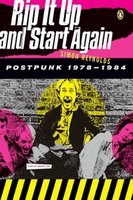 Rip It Up And Start Again: Postpunk 1978-1984, by Simon Reynolds
Rip It Up And Start Again: Postpunk 1978-1984, by Simon ReynoldsWARNING! Total Geek Alert ~
All the cool kids are talking about this book. I enjoyed it, and the subject matter is near and dear to my cold dead heart, but I'm puzzled by the scope of it.
Reynolds makes it a point to throw a big net over the term "postpunk," with chapters on Throbbing Gristle, 2-Tone, Mutant Disco and Goth. But his net has some large and curious holes. In a book that spends dozens of pages celebrating every burp, chirp and gurgle from the contemptible Green Gartside as a literate and witty deconstruction of pop, there is almost literally no mention of Elvis Costello, Joe Jackson or XTC. There's an effort throughout to make clear that Chicks Rock!, but the Pretenders are noticeably absent from the discussion. And there is a convincing argument that success on the pop charts = a noble and worthy goal, with seemingly every top 100 appearance by the Pop Group and Dexys Midnight Runners cause for vindication of their oddball theories. But if chart success matters, how can you write a book about "new" music from 1978-1984 without using the words "the" and "Police" together even once? It's unfathomable. Even discounting sales, their incorporation of reggae rhythms, world music concepts, literate lyrics, social consciousness and marketing savvy would have provided better examples than most of the forgotten never-beens populating this book. Hey, everyone's entitled to their own heroes, but if all you ever learned about rock/pop/new wave/postpunk/whatever you want to call it came from this book, you wouldn't even know the Police ever existed, but you'd know more than you ever wanted to about Teenage Jesus and the Jerks, among others.
It's also irritating how blithely Reynolds glosses over -- or even outright ignores -- some of the most singular and enduring acts of that period. The Psychedelic Furs are name-checked once. Depeche Mode is written off in a page or so (and he totally missed the fact that Martin Gore took over as songwriter afterVince Clarke left to form Yaz, who also aren't mentioned). Simple Minds, Sisters of Mercy and Bauhaus collectively get a scant few pages. Perhaps most annoying of all, Reynolds dismisses the entire 30 year career of the Cure in one short paragraph, essentially calling them a third-rate Joy Division clone with a tooooo theatrical frontman. This from a guy who names his book after an Orange Juice song.
But, as Mary Todd Lincoln once said, other than that, I enjoyed it just fine. Naturally, I agree with his basic premise, which is that the music that properly belongs under this umbrella was more adventurous, influential and lasting than that from just about anything else in "the rock era," as Casey Kasem used to call it.
The book starts with great insight and detail about John Lydon's formation of PiL, putting it all in, as David St. Hubbins once said, "too much fucking perspective." Then the second quarter or so goes on far too long, being basic variations on the simple theme of "in Sheffield/Cleveland/San Francisco/New York in 1974/1976/1978, rents were cheap and a bunch of disaffected art(sy) students were restless and bored before collectively becoming inspired by the DIY ethos of punk...the rest is (mini)-history." All that crap could have been compressed into a chapter. I mean really...the "legacy" of James Chance and the Contortions hardly merits this kind of analysis.
But I'm being negative again. Reynolds is a critic, and his heroes are critics and other Big Thinkers, and he sees patterns like a critic. I'm not entirely convinced by the notion that all these young disaffected art students were into implementing their deconstructivist theories via their fledgling musical skills with quite the clear-headed calculation Reynolds posits. More likely, I think a lot of the impulse behind these bands was, to coin a phrase, "same as it ever was" -- let's take drugs and meet chicks! Reynolds overplays his hand, with the result being that NME savant and super asshole Paul Morley ends up in the hero's costume, championing Frankie Goes To Hollywood (!), at the end of the book. Uh, sure. For those about to (write about) rock, we salute you!

No comments:
Post a Comment